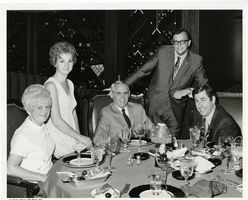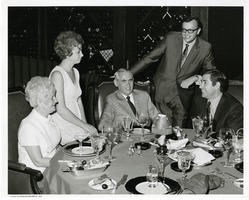Search the Special Collections and Archives Portal
Search Results

Alan Stock oral history interview: transcript
Date
Archival Collection
Description
Oral history interview with Alan Stock conducted by Barbara Tabach on December 27, 2017 for the Remembering 1 October Oral History Project. In this interview, Alan Stock discusses moving to Las Vegas, Nevada in 1999 for his job as a radio talk show host for KXNT. Stock describes the broadcast that covered the October 1, 2017 Las Vegas mass shooting from 11 PM on that night until 9 AM the next morning. He talks about some of the calls the station received from various members of the community, including survivors of the shooting, families of those at the event, people on lockdown in the nearby hotels, doctors, and general listeners. Stock describes some of the topics discussed on the broadcast, such as what was currently happening on the Las Vegas Strip, stories of the aftermath, and the support needed from the general public. Other topics include gun control and conspiracy theories. He discusses the impact this and other shootings would have on public affairs, including tighter security in daily living and public gatherings. He compares security in the United States to security in Israel and other countries, focusing on the idea of unconcealed guns worn in public. Throughout this interview, Alan Stock explains that the radio station's goal was to provide accurate information to the public during the aftermath of the October 1, 2017 mass shooting.
Text

Transcript of interview with Paul Senzaki, Alan Hess, and Charlie White III by Stefani Evans and Claytee White, September 9, 2016
Date
Archival Collection
Description
Architect Paul Senzaki, and artist-illustrator Charlie White III recall their experiences of working in Las Vegas: Paul on Treasure Island, The Palms, Fremont Street Experience, and World Market Center and Charlie on Treasure Island and its successor, TI; New York New York. Architectural historian Alan Hess, who is an expert on Las Vegas architecture, offers historical context and asks pertinent questions. While this interview touches on several iconic Las Vegas buildings, the conversation mostly details why and how Steve Wynn's Treasure Island involved the labors of artists, illustrators, art directors, and designers of stage and screen as well as the those of architects, contractors, planners, and subcontractors.
Text

Transcript of interview with Agnes Gauger by Coleen Mancini, February 24, 1977
Date
Archival Collection
Description
On February 24, 1977, Coleen Mancini interviewed the claims manager for the Culinary Workers and Bartenders Insurance Fund, Agnes Gauger (born Coleen Evans on November 21, 1926 in Arkansas) in her home in Las Vegas, Nevada. Mrs. Gauger’s daughter, Traci Sturdivant was also present during the interview. This interview covers significant changes and growth in Southern Nevada, including gambling and other industries, family life and recreation, and early atomic tests. Mrs. Gauger also discusses housing in the Las Vegas, Howard Hughes, McCarran Airport, medical facilities and education in Southern Nevada.
Text

Interview with Joyce Anne (Reese) Parkhurst, November 27, 2004
Date
Archival Collection
Description
Text

Interview with Frank Solaegui, December 1, 2004
Date
Archival Collection
Description
Text

Photograph of Mayor Oran K. Gragson and his wife Bonnie enjoying dinner at the Frontier Hotel and Casino, Las Vegas, Nevada, April 13, 1969
Date
Archival Collection
Description
Image

Photograph of Mayor Oran K. Gragson and his wife Bonnie enjoying dinner at the Frontier Hotel and Casino, Las Vegas, Nevada, April 13, 1969
Date
Archival Collection
Description
Image
Elbert Edwards oral history interview
Identifier
Abstract
Oral history interview with Elbert Edwards conducted by Layne Covington on October 16, 1986 for the Ralph Roske Oral History Project on Early Las Vegas. Edwards first talks about his family background before talking about what it was like to live in Panaca, Nevada. Edwards later talks about his wife’s and his political involvement, and his involvement in education. He then discusses Hoover (Boulder) Dam, his job as a registrar in the Selective Service, and the effects that the World War II years had on Las Vegas, Nevada.
Archival Collection
Don T. Walker Photograph Collection
Identifier
Abstract
The Don T. Walker Photograph Collection (1900-1995) is comprised of black-and-white and color photographs taken by or belonging to Las Vegas photographer and Nevada historian Don Travis Walker. The photographs taken by Walker include ghost towns in Nevada, Arizona, and California, as well as a series on Phil Benson, editor and publisher of the Southern Nevada Times. Other items in the collection include photographs taken by other people related to the Moulin Rouge Hotel in Las Vegas, various photographs of historic sites in Nevada, and a program from the Nevada State Museum and Historical Society for its "Moulin Rouge: History in the Making" exhibition.
Archival Collection
Charles Rozaire Collection on Tule Springs, Nevada
Identifier
Abstract
The Charles Rozaire Collection on Tule Springs, Nevada (1950-2005) contains photographic slides of various archeological sites across Clark County, Nevada, the majority of which were taken at the Tule Springs archaeological site. The collection also contains Rozaire's files documenting the excavation investigations at Tule Springs which include Rozaire's writings, newspaper clippings, programs, and photocopied articles regarding Tule Springs.
Archival Collection
